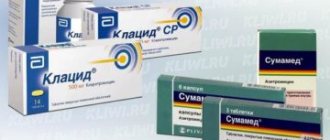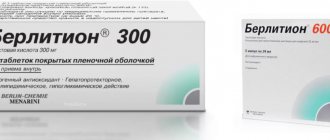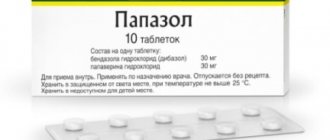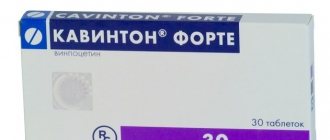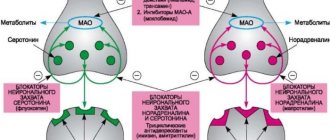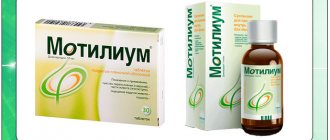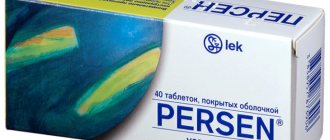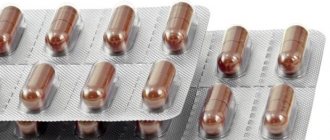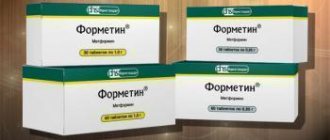Pharmacodynamics and pharmacokinetics
Wikipedia states that acetylsalicylic acid is a salicylic ester of acetic (ethanoic) acid and has the ability to relieve pain, relieve fever and inflammation, and also prevent platelet .
Acetylsalicylic acid (ASA) irreversibly inhibits the COX-1 enzyme, as a result of which the important mediator of platelet TXA-2 is blocked and platelet .
It is generally accepted that ASA can suppress platelet in other ways, so it can be used in a fairly wide range of vascular diseases .
Magnesium hydroxide contained in tablets protects the mucous membrane of the digestive canal from the aggressive action of ASA.
ASA is absorbed from the gastrointestinal tract almost completely. T1/2 of the substance - about 15 minutes. This rate of elimination is due to the fact that acetylsalicylic acid is quickly hydrolyzed into salicylic acid (SA) in the blood plasma, liver and intestines.
For salicylic acid, T1/2 is approximately 3 hours. When enzyme systems are saturated, which is observed with simultaneous administration of ASA in a dose exceeding 3 g, the indicator can increase significantly.
Bioavailability of ASA is about 70%. The indicator is variable due to the fact that the substance undergoes presystemic hydrolysis under the influence of enzymes. The bioavailability of SA ranges from 80 to 100%.
The doses of magnesium hydroxide used do not affect the bioavailability of ASA.
CARDIOMAGNIL: instructions, reviews, analogues, price in pharmacies
Cardiomagnyl has an antiplatelet effect and is a non-steroidal anti-inflammatory drug. The anti-inflammatory effect is associated with irreversible inhibition of cyclooxygenase-1 due to the acetylation reaction.
Thromboxane A2 under the influence of acetylsalicylic acid (ASA) is reduced as a result of selective inhibition of its synthesis. There are probably other mechanisms for reducing platelet aggregation under the influence of ASA. Magnesium hydroxide has a protective effect on the gastric mucosa, which is important when taking ASA.
ASA is completely absorbed when taken orally from the gastrointestinal tract. Hydrolysis to salicylic acid occurs with the participation of esterases in the liver, intestines and blood plasma. The half-life of ASA is 15 minutes, salicylic acid is 3 hours.
Additional intake of ASA (more than 3 g) may prolong the half-life of salicylic acid due to complete saturation of enzyme systems. The bioavailability of the ASA metabolite, salicylic acid, ranges from 80 to 100%.
The bioavailability of ASA is approximately 70%, but this value is very variable due to presystemic hydrolysis in the wall of the stomach, intestines and liver tissue. Magnesium hydroxide in cardiomagnyl does not affect the bioavailability of ASA.
Indications for use
Preventive therapy for increased platelet aggregation in: thrombosis and embolism, coronary heart disease, myocardial infarction, ischemic strokes and cerebrovascular accidents, migraine. Used for the prevention of thrombosis in cardiovascular surgery (in the postoperative period after coronary angioplasty, coronary artery bypass grafting).
Mode of application
1 tablet of Cardiomagnyl-Forte or 2 tablets of Cardiomagnyl (150 g ASA) on the first day of treatment, then 75 mg (1 tablet of Cardiomagnyl) 1 time per day.
Take the tablet with a small amount of water. If necessary, the tablets are chewed or crushed. It is recommended to consume after meals.
The duration of treatment is determined by the doctor individually depending on the clinic, indications and severity of the disease.
Side effects
Allergic reactions, bronchospasm, hemorrhagic stroke, bleeding from the gastrointestinal tract. Heartburn, dyspeptic disorders, irritable bowel syndrome, ulcers of the gastrointestinal mucosa, and perforation of an existing gastrointestinal ulcer may occur.
A clinical blood test reveals eosinophilia, decreased platelet count, aplastic anemia, neutropenia, and agranulocytosis. The coagulogram shows hypoprothrombinemia.
Rarely, headache, tinnitus, drowsiness, and dizziness are observed.
Contraindications
• Tendency to bleeding or a recent episode of bleeding (hemorrhagic diathesis, hemorrhagic stroke, hypothrombinemia, gastrointestinal bleeding, hemophilia); • bronchial asthma in response to the administration of ASA; • allergy to the components of the drug (especially ASA); • deficiency of glucose-6- phosphate dehydrogenase;• renal failure;• taking methotrexate at a dose of more than 15 mg/week;• age under 18 years.
Pregnancy
cardiomagnyl is contraindicated in the 1st (anomalies of fetal development) and 3rd (increased bleeding during childbirth, intraventricular hemorrhages in the fetus, premature closure of the oval duct of the fetus, anomalies of labor) trimesters of pregnancy, as well as in nursing women. In the 2nd trimester it is prescribed with caution.
Interaction with other drugs
The combined use of a high dose of cardiomagnyl and oral anticoagulants potentiates the effect of the latter. Cardiomagnyl potentiates the effects of fibrinolytics and antiplatelet agents.
Diuretics (spironolactone) and antihypertensives reduce their effect when taking cardiomagnyl. Enhances the effects of chlorpropamide and methotrexate.
The absorption of cardiomagnyl is significantly reduced when using antacids and sorbents.
Overdose
In case of an overdose of cardiomagnyl, tachypnea develops, bleeding time is prolonged, nausea, anxiety, tinnitus, sweating, and decreased hearing acuity occur. Vomit contains streaks of blood. A dangerous dosage is considered to be 150 mg/kg.
In severe cases, ketoacidosis, cardiac arrhythmias, hypoglycemia, acute cardiovascular failure, hyperventilation, acute respiratory failure, and coma develop.
If signs of overdose are detected, the patient is hospitalized, the stomach is washed, sorption enteral drugs are prescribed, and, if necessary, alkaline diuresis is provided. In the future, symptomatic therapy is necessary.
Release form
Cardiomagnyl and Cardiomagnyl-forte are film-coated tablets, heart-shaped, in dark glass bottles of 30 and 100 pcs.
Storage conditions
Shelf life – 5 years at temperatures not exceeding 25°C. The storage location must be protected from children, light and moisture. Over-the-counter release from the pharmacy.
Compound
Cardiomagnyl : Active ingredients: acetylsalicylic acid – 75 mg, magnesium hydroxide – 15.2 mg.
Cardiomagnyl-forte:
Active ingredients: acetylsalicylic acid - 150 mg, magnesium hydroxide - 30.39 mg. Auxiliary components: corn and potato starch, microcrystalline cellulose, talc, magnesium stearate, hypromellose, polyethylene glycol.
Additionally
Prescribed with caution for gout and hyperuricemia (reduces the excretion of uric acid). Do not use before surgery or in the postoperative period (risk of bleeding).
Patients with diabetes mellitus who take cardiomagnyl for a long time require correction of hypoglycemic drugs (ASA causes hypoglycemia). Do not use in combination with ibuprofen (leveling the therapeutic effect of ASA).
When taking glucocorticoids, it is possible to reduce the level of salicylates in the blood plasma; after discontinuation of glucocorticoids, salicylates increase (risk of overdose).
While taking Cardiomagnyl, monitoring of a clinical blood test is necessary.
Source: //www.medcentre.com.ua/medicamenty/kardiomagnil.html?page=2
Indications for use of Cardiomagnyl
The method of administration and dose depend on the indications for use of the drug.
Cardiomagnyl tablets - what are they for?
Indications for use of Cardiomagnyl:
- acute ( myocardial infarction (MI), unstable angina ) or chronic ischemic heart disease ;
- primary prevention of cardiovascular diseases in patients at risk (those suffering from obesity, diabetes mellitus , arterial hypertension , hypercholesterolemia , as well as those with a family history of myocardial infarction under the age of 55 years);
- primary prevention of acute venous thrombosis and prevention of recurrent thrombus (secondary prevention of thrombus formation).
What is the medicine Cardiomagnyl Forte for?
Forte tablets are indicated for ischemic heart disease (acute or chronic).
Composition of Cardiomagnyl
Cardiomagnyl tablets have the following composition:
| Description | White heart-shaped or oval (Cardiomagnyl forte) tablets |
| Concentration of acetylsalicylic acid, mg per piece. | 75 or 100 |
| Concentration of magnesium hydroxide, mg per piece. | 15.2 or 30.39 |
| Auxiliary components | Talc, corn and potato starch, macrogol (propylene glycol), microcrystalline cellulose, hypromellose, magnesium stearate |
| Package | Bottles of 30 or 100 pcs. |
Contraindications for Cardiomagnyl
The annotation lists the following contraindications for the drug:
- hypersensitivity to ASA and other salicylates;
- intolerance to any of the auxiliary components of the tablets;
- aggravated peptic ulcer ;
- bleeding tendency ( hemophilia , thrombocytopenia vitamin K deficiency );
- severe dysfunction (with GFR below 10 ml per minute) or kidney failure;
- severe cardiac decompensation;
- history of angioedema or bronchial asthma provoked by the use of NSAIDs/salicylates
- childhood;
- last trimester of pregnancy;
- simultaneous use of methotrexate at a dose exceeding 15 mg/week.
Contraindications
Cardimoagnil is prescribed with caution for hyperuricemia, gout, renal, liver failure, hay fever, allergies, and the second trimester of pregnancy.
The instructions highlight contraindications:
- intolerance to the components of the composition;
- cerebral hemorrhage;
- hemophilia;
- hypercholesterolemia
- vitamin K deficiency, hemorrhagic diathesis, thrombocytopenia;
- gastrointestinal bleeding;
- 1st and 3rd trimesters of pregnancy;
- age up to 18 years.
Side effects
Most often (in approximately every 10th patient) the following were recorded during the use of Cardiomagnyl: decreased platelet , increased bleeding, reflux and heartburn .
The category of frequent (recorded with a frequency of 0.01 to 0.1) side effects includes: insomnia, headache, bronchospasm (in patients with bronchial asthma ), erosive lesions of the upper digestive canal, diarrhea, nausea, vomiting, dyspepsia, rashes on skin of various types, purpura , urticaria , angioedema , erythema multiforme , hemorrhagic vasculitis , acute epidermal necrolysis , Stevens-Johnson syndrome .
Some patients may:
- hidden bleeding;
- allergic rhinitis;
- anaphylactic reactions;
- tinnitus;
- ulceration of the walls of the digestive canal in its upper section (in extremely rare cases, the lower section may also be affected);
- melena;
- vomiting blood;
- perforation of the walls of the digestive canal and the development of gastrointestinal bleeding;
- hypoglycemia;
- drowsiness;
- vertigo;
- intracerebral bleeding;
- anemia (in patients who receive Cardiomagnyl for a long period of time);
- changes in the blood picture (decrease in the concentration of prothrombin, platelets, neutrophils, leukocytes in the blood; eosinophilia, aplastic anemia; increased levels of alkaline phosphatase and transaminases);
- esophagitis;
- stomatitis;
- colitis;
- formation of strictures in the digestive canal;
- exacerbation of spastic colitis.
Dose-dependent side effects: acute hepatitis , hearing loss and deafness. The phenomena are reversible.
Cardiomagnyl tablets: instructions for use
Instructions for use of Cardiomagnyl
For ischemic heart disease (in any form), the starting dose is 150 mg/day. For maintenance treatment, half the dose is prescribed.
For unstable angina /acute myocardial infarction, the optimal dosage is from 150 to 450 mg/day. Treatment should be started as soon as possible after the onset of symptoms.
How to take Cardiomagnyl for prevention?
To prevent re-formation of blood clots, at the initial stages of treatment the patient is prescribed 150 mg/day, and subsequently - 75 mg/day.
A prophylactic dose to prevent cardiovascular events (for example, acute coronary syndrome ) and thrombosis is 75 mg/day.
Why is Cardiomagnyl Forte prescribed, and what is the optimal dosage?
Forte tablets are indicated for patients with coronary artery disease. Treatment begins by prescribing 1 tablet per day to the patient. and subsequently switch to half the maintenance dose.
How to take the pills?
The medicine is swallowed whole (if impossible, the tablet can be chewed, ground into powder or broken in half) with liquid.
How to take it correctly - morning or evening?
The manufacturer's instructions do not provide clear instructions as to what time of day to take Cardiomagnyl tablets.
Doctors, answering the question “When is it better to take the drug - in the morning or in the evening?”, recommend taking the medicine in the evening, about 60 minutes after dinner.
How long can I take the drug?
The duration of treatment depends on the course and severity of the disease.
In some cases (according to indications, taking into account contraindications and subject to periodic monitoring of blood pressure and hemocoagulation), the drug can be prescribed for life.
How long to take the drug can only be determined by the attending physician.
Analogs
The drug "Acecardol" is today one of the most accessible analogues of "Cardiomagnyl". This drug is indicated for the prevention of myocardial infarction and ischemic stroke, along with deep vein thrombosis and other diseases. This medicine is contraindicated during pregnancy.
The drug "CardiASK" is another Russian analogue of "Cardiomagnyl", which belongs to the same pharmacological subgroup as the original medicine. The action of CardiASK is also based on acetylsalicylic acid in amounts of 50 milligrams or more, which directly depends on the form of release. Each pack contains instructions for use.
The analogues of Cardiomagnyl do not end there.
The drug "Aspirin Cardio" is an inexpensive substitute for "Cardiomagnyl", the work of which is also based on the use of acetylsalicylic acid. It is also prescribed for the prevention and treatment of vascular and heart diseases. This analogue has a large set of contraindications; adverse reactions cannot be excluded, and therefore medical consultation is required before using it.
We will not consider in detail the instructions for use of Cardiomagnyl analogues.
Overdose
For an adult, a dose of 150 mg/kg is considered dangerous.
A long course of treatment using high doses can cause chronic intoxication, which manifests itself:
- the appearance of ringing in the ears;
- vasodilation;
- nausea;
- dizziness;
- deafness;
- vomiting;
- headache;
- disturbance of consciousness;
- sweating
Symptoms of acute poisoning due to overdose are: fever;
- hyperventilation;
- anxiety;
- acid-base imbalance ( gas ( respiratory ) alkalosis , metabolic acidosis ).
In case of severe poisoning, a syndrome of central nervous system depression develops, which, in turn, can lead to cardiovascular collapse , coma , and respiratory arrest.
Acute ASA poisoning - when taking a dose exceeding 300 mg/kg - often causes acute liver failure. A dose exceeding 500 mg/kg is lethal.
Treatment for acute overdose: gastric lavage, administration of enterosorbents, restoration of electrolyte and fluid balance to avoid dehydration, acidosis , hyperkalemia and hyperpyrexia .
To remove salicylic acid from blood plasma, forced alkaline diuresis , hemoperfusion or hemodialysis .
Interaction
Cardiomagnyl potentiates the effects:
- anticoagulants;
- hypoglycemic drugs;
- methotrexate;
- acetazolamide.
Reduces the effectiveness of ACE inhibitors, spironolactone and furosemide .
Olestyramine and antacids impair absorption of the drug .
It is not recommended to take Cardiomagnyl in combination with NSAIDs .
Since Mg is included in the drug in small quantities, the clinical significance of its interaction with the ASA contained in the tablets is minimal.
In combination with Probenecid, a mutual weakening of the effect of both drugs is observed.
GCS, enhancing the excretion of salicylic acid , thereby weakens their effect.
special instructions
Long-term combined use of the drug with NSAIDs increases the risk of adverse reactions.
In elderly people, long-term use of Cardiomagnyl increases the likelihood of developing gastrointestinal bleeding.
In case of planned surgery, the tablets should be stopped several days before surgery.
The drug is used with caution in allergy sufferers, patients with bronchial asthma , kidney/liver dysfunction , existing lesions of the gastric mucosa, and dyspepsia .
The drug is not intended for the treatment of children and adolescents.
It does not slow down the speed of reactions, so there are no restrictions regarding driving vehicles/machinery during its use.
Contraindications to the use of the drug
The drug "Cardiomagnyl" has a number of contraindications for use, including:
- Development of cerebral stroke in patients.
- The patient has bronchial asthma, which developed as a result of treatment with non-steroidal anti-inflammatory drugs or salicylates.
- The appearance of frequent bleeding, regardless of the reasons that cause it.
- The presence of a stomach or intestinal ulcer, when the pathology is at the stage of exacerbation.
- The appearance of bleeding in the digestive organs.
- Development of severe forms of renal failure.
- When patients are simultaneously treated with Methotrexate.
- This drug is contraindicated for women in the first and last trimester of pregnancy.
- While breastfeeding the baby.
- The age of patients is up to eighteen years.
- The presence of intolerance to the active components of the drug and other non-steroidal anti-inflammatory drugs.
This is what it says in the instructions for use. Should I take Cardiomagnyl before or after meals? There is no guidance on this. It is better to do this at the same time.
Only after consultation with the doctor can you begin taking it to patients who have suffered a stomach ulcer, as well as to those who suffer from bleeding in the digestive organs. Consultation regarding the possibility of using this drug is also necessary for patients suffering from gout, kidney and liver failure, bronchial asthma, and also nasopharyngeal polyps, hay fever and allergies. Pregnant women during the second trimester also need medical advice if treatment is necessary.
This is confirmed by the instructions for use of the drug "Cardiomagnyl".
What can replace Cardiomagnyl?
Analogues of Cardiomagnyl by ATC code, composition of active ingredients and release form: Akard , Asatsil-A , Aspeter , Aspirin Cardio , Acetylsalicylic acid , Magnikor , Trombo ACC , Trombolic Cardio , Trombogard , Ecorin .
Analogs of the drug with a similar mechanism of action: Avix , Agrenox , Aspigrel , Brilinta , Vazotik , Monofram , Deplatt , Zilt , Ipaton , Clopidogrel , Clopilet , Lopigrol , Miogrel , Plavigrel , Plavix , Trombex , Effient .
The price of Cardiomagnyl analogues is from 8 rubles.
Which is better: Cardiomagnyl or Thromboass?
Thrombo ACC tablets are a NSAID that is used to prevent stroke , heart attack , deep vein thrombosis , thromboembolism and a number of other pathological conditions. The basis of the drug is acetylsalicylic acid .
The principle of action of Cardiomagnyl and its analogue is based on the ability of ASA to block the synthesis of thromboxane and Pg, which helps reduce platelet , as well as reduce inflammation.
In addition, both drugs reduce the content of K-dependent coagulation factors and increase plasma activity.
The main differences between Cardiomagnyl and its substitute are: composition and release form. Trombo ACC tablets contain 50 or 100 mg of ASA, and do not contain magnesium hydroxide. To minimize the negative effects of ASA, tablets are coated with a special enteric protective coating.
Patients leave approximately the same reviews about the drugs, but Thrombo ACC, in their subjective opinion, is somewhat less likely to cause unwanted side reactions.
Acecardol and Cardiomagnyl - differences
Acecardol is a drug whose active ingredient is also ASA. Its differences from Cardiomagnyl are the absence of magnesium hydroxide in the composition, the release form (tablets in a red coating) and the dosage of ASA (50/100/300 mg/tablet).
Acecardol tablets are recommended to be taken 1 time per day. before meals, take Cardiomagnyl tablets after meals.
Which is better: Cardiomagnyl or Aspirin Cardio?
Aspirin Cardio is an original drug from Bayer AG. The drug belongs to the group of ASA drugs with the largest evidence base. Thanks to a special enteric coating, its active substance is released not in the stomach, but in the intestinal tract, so Aspirin Cardio is better tolerated by patients than regular acetylsalicylic acid .
The tablets are produced in calendar packaging, which makes it possible to improve control over the patient’s compliance with the treatment prescribed by the doctor.
CARDIOMAGNIL
– magnesium hydroxide – acetylsalicylic acid
Release form, composition and packaging
◊ Film-coated tablets
white, in the shape of a stylized “heart”.
| 1 tab. | |
| acetylsalicylic acid | 75 mg |
| magnesium hydroxide | 15.2 mg |
Excipients: corn starch – 9.5 mg, microcrystalline cellulose – 12.5 mg, magnesium stearate – 150 mcg, potato starch – 2 mg.
Shell composition:
hypromellose (methylhydroxypropylcellulose 15) – 460 mcg, propylene glycol – 90 mcg, talc – 280 mcg.
30 pcs. – brown glass bottles (1) – cardboard packs with first opening control. 100 pieces. – brown glass bottles (1) – cardboard packs with first opening control.
◊ Film-coated tablets
white, oval in shape with a notch on one side.
| 1 tab. | |
| acetylsalicylic acid | 150 mg |
| magnesium hydroxide | 30.39 mg |
Excipients: corn starch - 19 mg, microcrystalline cellulose - 25 mg, magnesium stearate - 305 mcg, potato starch - 4 mg.
Shell composition:
hypromellose (methylhydroxypropylcellulose 15) – 1.2 mg, propylene glycol – 240 mcg, talc – 720 mcg.
30 pcs. – brown glass bottles (1) – cardboard packs with first opening control. 100 pieces. – brown glass bottles (1) – cardboard packs with first opening control.
pharmachologic effect
NSAID, antiplatelet agent. The mechanism of action of acetylsalicylic acid is based on irreversible inhibition of the COX-1 enzyme, as a result of which the synthesis of thromboxane A2 is blocked and platelet aggregation is suppressed.
It is believed that acetylsalicylic acid has other mechanisms for suppressing platelet aggregation, which expands the scope of its use in various vascular diseases.
Acetylsalicylic acid also has anti-inflammatory, analgesic and antipyretic effects.
Magnesium hydroxide, which is part of Cardiomagnyl, protects the gastrointestinal mucosa from the effects of acetylsalicylic acid.
Pharmacokinetics
Suction
After taking the drug orally, acetylsalicylic acid is absorbed from the gastrointestinal tract almost completely.
The bioavailability of acetylsalicylic acid is about 70%, but this value is characterized by significant individual variability due to presystemic hydrolysis in the mucous membranes of the gastrointestinal tract and in the liver with the formation of salicylic acid under the action of enzymes. The bioavailability of salicylic acid is 80-100%.
Metabolism and excretion
T1/2 of acetylsalicylic acid is about 15 minutes, because with the participation of enzymes, it is quickly hydrolyzed into salicylic acid in the intestines, liver and blood plasma. T1/2 of salicylic acid is about 3 hours, but when taking acetylsalicylic acid in high doses (>3 g), this figure can increase significantly as a result of saturation of enzyme systems.
Magnesium hydroxide (in the doses used) does not affect the bioavailability of acetylsalicylic acid.
Indications
- primary prevention of cardiovascular diseases such as thrombosis and acute heart failure in the presence of risk factors (for example, diabetes mellitus, hyperlipidemia, hypertension, obesity, smoking, old age);
- prevention of recurrent myocardial infarction and blood vessel thrombosis;
- prevention of thromboembolism after vascular surgery (coronary artery bypass grafting, percutaneous transluminal coronary angioplasty);
- unstable angina.
Use in childhood
Contraindicated in children and adolescents under 18 years of age.
For impaired renal function
The drug is contraindicated in severe renal failure (creatinine clearance less than 10 ml/min); in case of renal failure should be used with caution.
For liver dysfunction
In case of liver failure, it should be used with caution.
Conditions for dispensing from pharmacies
The drug is approved for use as a means of OTC.
Storage conditions and periods
The drug should be stored in a place protected from light and out of reach of children at a temperature not exceeding 25°C. Shelf life – 3 years. Do not use after expiration date.
The description of the drug CARDIOMAGNIL is based on the officially approved instructions for use and approved by the manufacturer.
Found an error? Select it and press Ctrl+Enter.
Source: //health.mail.ru/drug/cardiomagnyl/
Alcohol compatibility
With simultaneous intake of alcohol and ASA, an additive effect is observed.
Cardiomagnyl during pregnancy
In the 1st trimester, taking high doses of salicylates is associated with an increased incidence of fetal developmental defects.
In the 2nd trimester, drugs of this group are used taking into account the therapeutic effect for the mother’s body and the potential risks for the unborn child.
In the last 3 months of pregnancy, salicylates are contraindicated. In the 3rd trimester, high doses of ASA can cause inhibition of labor, increased bleeding (both in the mother and the fetus), and premature closure of the ductus botallus in the fetus.
The use of ASA immediately before birth can provoke hemorrhagic cerebrovascular accident (especially in premature infants).
Salicylates and their metabolic products pass into breast milk. Accidental intake of a small dose of ASA during lactation does not require cessation of breastfeeding and is not accompanied by the development of undesirable effects in the child. However, high doses or long-term use of these drugs requires discontinuation of breastfeeding.
Reviews during pregnancy allow us to conclude that most often the drug is prescribed to prevent thrombotic complications in risk groups, in the complex treatment of placental insufficiency and gestosis , as well as for the treatment of polyhydramnios .
Almost all expectant mothers noted that Cardiomagnyl was well tolerated, and improvements (in particular, a decrease in viscosity and an increase in blood mobility) became noticeable after 10-14 days of treatment.
Cardiomagnyl
The use of salicylates in high doses in the first trimester of pregnancy is associated with an increased incidence of fetal defects. In the second trimester of pregnancy, salicylates can be prescribed only taking into account a strict assessment of risks and benefits.
In the third trimester of pregnancy, salicylates in high doses (>300 mg/day) cause inhibition of labor, premature closure of the ductus arteriosus in the fetus, increased bleeding in the mother and fetus, and administration immediately before birth can cause intracranial hemorrhages, especially in premature infants. The administration of salicylates in the first and third trimesters of pregnancy is contraindicated.
The available clinical data are insufficient to establish the possibility or impossibility of using the drug during breastfeeding. Before prescribing acetylsalicylic acid during breastfeeding, the potential benefits of drug therapy should be assessed against the potential risk for infants.
Use for liver dysfunction
In case of liver failure, it should be used with caution.
Use for renal impairment
The drug is contraindicated in severe renal failure (creatinine clearance less than 10 ml/min); in case of renal failure should be used with caution.
Use in children
Contraindicated in children and adolescents under 18 years of age.
special instructions
You should take the drug Cardiomagnyl after a doctor’s prescription.
Acetylsalicylic acid can provoke bronchospasm, as well as cause attacks of bronchial asthma and other hypersensitivity reactions. Risk factors include a history of bronchial asthma, hay fever, nasal polyposis, chronic respiratory diseases, and allergic reactions (for example, skin reactions, itching, urticaria) to other drugs.
Acetylsalicylic acid can cause bleeding of varying severity during and after surgery.
Several days before planned surgery, the risk of bleeding should be assessed compared with the risk of ischemic complications in patients taking low doses of acetylsalicylic acid. If the risk of bleeding is significant, acetylsalicylic acid should be temporarily discontinued.
The combination of acetylsalicylic acid with anticoagulants, thrombolytics and antiplatelet drugs is accompanied by an increased risk of bleeding.
Taking acetylsalicylic acid in low doses can trigger the development of gout in predisposed individuals (those with reduced excretion of uric acid).
The combination of acetylsalicylic acid with methotrexate is accompanied by an increased incidence of side effects from the hematopoietic organs.
Taking acetylsalicylic acid in high doses has a hypoglycemic effect, which must be kept in mind when prescribing it to patients with diabetes mellitus receiving oral hypoglycemic agents and insulin.
When using systemic corticosteroids and salicylates in combination, it should be remembered that during treatment the concentration of salicylates in the blood is reduced, and after discontinuation of systemic corticosteroids, an overdose of salicylates is possible.
The combination of acetylsalicylic acid with ibuprofen is not recommended in patients with an increased risk of cardiovascular diseases: when used simultaneously with ibuprofen, a decrease in the antiplatelet effect of acetylsalicylic acid in doses of up to 300 mg is observed, which leads to a decrease in the cardioprotective effects of acetylsalicylic acid.
Exceeding the dose of acetylsalicylic acid beyond the recommended therapeutic doses is associated with the risk of gastrointestinal bleeding.
With long-term use of acetylsalicylic acid in low doses as antiplatelet therapy, caution is required in elderly patients due to the risk of gastrointestinal bleeding.
When taking acetylsalicylic acid with ethanol at the same time, there is an increased risk of damage to the gastrointestinal mucosa and prolongation of bleeding time.
Impact on the ability to drive vehicles and operate machinery
During treatment with acetylsalicylic acid, patients should be careful when driving vehicles and engaging in potentially hazardous activities that require increased concentration and speed of psychomotor reactions.
Source: //ProTabletky.ru/cardiomagnyl/
Reviews of Cardiomagnyl
There are different reviews about Cardiomagnyl on the forums. Most patients who take these tablets as prescribed by their doctor are satisfied with them, but sometimes there are negative reviews. The main reasons for the low rating of the product are its high price and side effects.
Research results and expert reviews allow us to conclude that ASA is the main drug of antithrombotic therapy in patients at risk of cardiovascular pathologies (including those occurring during pregnancy).
An important feature of the drug Cardiomagnyl is the presence in its composition of Mg hydroxide - a “buffer” that prevents the occurrence of the damaging effects of ASA and, in particular, the erythematous-hemorrhagic form of NSAID gastropathy .
Studies have shown that Cardiomagnyl is more effective than enteric dosage forms in inhibiting platelet . At the same time, the frequency of adverse reactions from the digestive system was the lowest in comparison with regular aspirin and aspirin , which is available in the form of enteric tablets.
Thus, having the same indications and contraindications for use as conventional ASA, Cardiomagnyl is a much safer, but no less effective means for preventing complications of CVD diseases.
Prophylactic use
"Cardiomagnyl" can be used to prevent various pathologies of the heart and blood vessels:
- thrombosis;
- angina pectoris;
- ischemic stroke, cerebrovascular accidents;
- acute coronary syndrome, myocardial infarction;
- after surgical interventions on blood vessels.
It is most in demand for the treatment of patients over 50 years of age who have already encountered the unfavorable conditions listed in the list or are at high risk of developing them. The drug is most often used long-term (including lifelong) at a dosage of 75-150 mg. It is drunk once a day, monitoring the level of hemoglobin and red blood cells due to the likelihood of anemia.
Cardiomagnyl price: how much does 75 mg/15.2 mg and 150 mg/30.39 mg cost?
The average price of Cardiomagnyl tablets 75 mg No. 100 in Ukrainian pharmacies is 85 UAH. You can buy Forte tablets for 95-98 UAH (package No. 100). At the same time, the cost of the drug in Zaporozhye, Kyiv, Kharkov or Odessa differs slightly.
The price of Cardiomagnyl in Moscow and St. Petersburg is from 120 rubles. for package No. 30 and from 215 rubles. per package No. 100. The cost of Forte tablets is from 125 per package No. 30 and 260 rubles. and from per package No. 100.
- Online pharmacies in RussiaRussia
- Online pharmacies in UkraineUkraine
- Online pharmacies in KazakhstanKazakhstan
Pharmacy 36.6
- Cardiomagnyl tabl.p.o. 75mg N100TAKEDA PHARMACEUTICALS
- Cardiomagnyl tabl.p.o. 150mg N30TAKEDA PHARMACEUTICALS
- Cardiomagnyl tabl.p.o. 75mg N100TAKEDA PHARMACEUTICALS
- Cardiomagnyl tabl.p.o. 75mg N30TAKEDA PHARMACEUTICALS
- Cardiomagnyl tabl.p.o. 150mg N100TAKEDA PHARMACEUTICALS
ZdravZone
- Cardiomagnyl 150mg+30.39mg No. 100 tablet Takeda Pharmaceutical Company Li
- Cardiomagnyl 75mg+15.2mg No. 30 tabletsTakeda Pharmaceutical Company Li
- Cardiomagnyl 150mg+30.39mg No. 30 tabletsTakeda Pharmaceutical Company Li
- Cardiomagnyl 75mg+15.2mg No. 100 tabletsTakeda Pharmaceutical Company Li
- Cardiomagnyl 75mg No. 100 tabletsTakeda Pharmaceutical Company Li
Pharmacy IFC
- CardiomagnylNycomed Danmark Asp, Denmark
- CardiomagnylNycomed Danmark Asp, Denmark
- CardiomagnylNycomed Danmark Asp, Denmark
- CardiomagnylNycomed Danmark Asp, Denmark
show more
Composition and release form
| Film-coated tablets | 1 table |
| acetylsalicylic acid | 75 mg |
| magnesium hydroxide | 15.2 mg |
| excipients: corn starch; microcrystalline cellulose (MCC); magnesium stearate; potato starch; hypromellose (methylhydroxypropylcellulose 15); propylene glycol; talc |
in brown glass bottles, sealed with a white screw cap (made of polyethylene) with a built-in removable cap with a seal, to which is attached a ring for tearing off the sealing gasket, ensuring first opening control, 30 or 100 pcs.
| Film-coated tablets, forte | 1 table |
| acetylsalicylic acid | 150 mg |
| magnesium hydroxide | 30.39 mg |
| excipients: corn starch; microcrystalline cellulose (MCC); magnesium stearate; potato starch; hypromellose (methylhydroxypropylcellulose 15); propylene glycol; talc |
in brown glass bottles, sealed with a white screw cap (made of polyethylene) with a built-in removable cap with a seal, to which is attached a ring for tearing off the sealing gasket, ensuring first opening control, 30 or 100 pcs.

